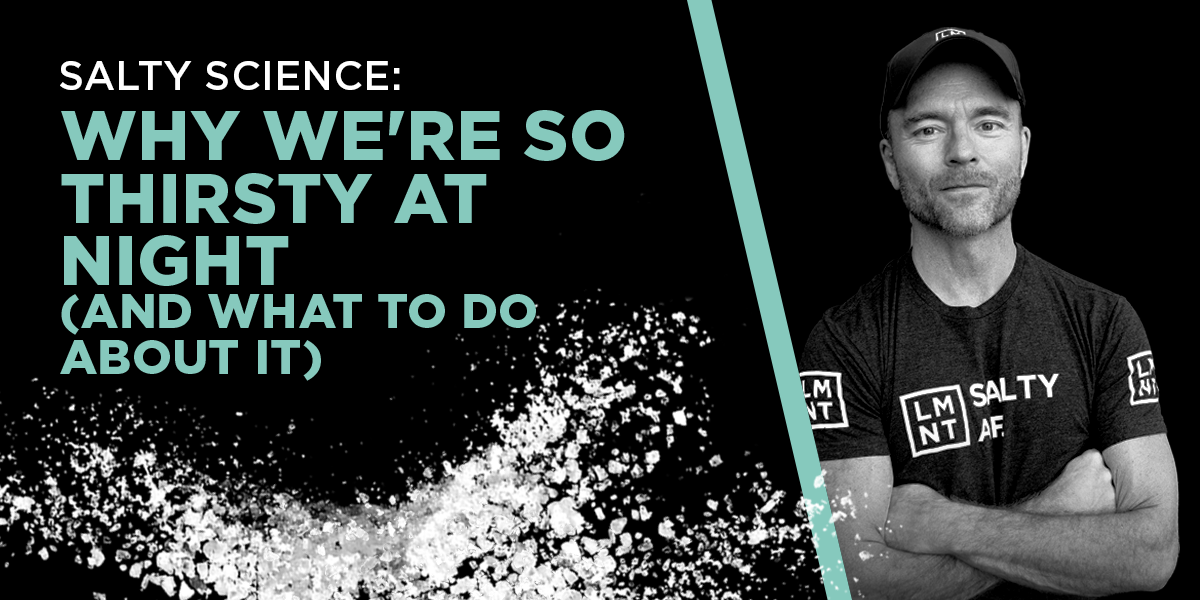It’s not fun to wake up in the dead of night with a raging thirst. It also isn’t fun to get thirsty after dinner, when your stomach is already full of food.
Nighttime thirst may not be fun, but it’s extremely common. Most of the time, it’s driven by a handful of factors that can be easily modified.
The modification is sometimes as simple as drinking more water. But drinking more water has potential downsides, like electrolytes disturbances and bleary-eyed trips to the bathroom at 3 AM.
I want to minimize my nighttime wakeups. The less I wake up, the more efficient and restful my sleep will be. I assume you feel the same way.
So how can you deal with nighttime thirst without putting your bladder on hyperdrive? I’ll share some practical tips at the end of this article. First, let’s cover how thirst works and why it might be happening at night.
How Does Thirst Work?
To understand thirst, first you must understand fluid balance. Proper fluid balance is the key to a healthy, hydrated state.
Fluid balance refers to the balance of fluids inside and outside your cells. This balance keeps your blood flowing in your veins, your brain floating in your cranium, your tear ducts producing tears, your sweat glands producing sweat, and much more. Your body is about 60% water weight, so the partitioning of this water is critical.
Many factors affect fluid balance. It’s a complex system. To simplify, these factors can be boiled down to:
- How much water you’re taking in
- How much water you’re losing
- How many electrolytes you’re taking in
- How many electrolytes you’re losing
The first bullet, how much fluid you consume, is regulated by the thirst mechanism. But how does your body know when to get thirsty?
Your body knows when to get thirsty when it detects a decrease in blood volume, a rise in blood osmolality (electrolytes in the blood), or the presence of certain hormones.
Take the first reason: falling blood volume. If you sweat excessively, your blood volume will drop. Receptors in your brain will notice and tell a brain region called the hypothalamus to activate thirst. Then you’ll drink something and blood volume will be restored.
Another example. If you eat a salty meal, your plasma osmolality will rise. Again receptors in your brain will tell the hypothalamus to trigger thirst. You’ll drink water and the osmolality will fall.
Hormones like antidiuretic hormone, angiotensin, and aldosterone affect thirst too. We’ll touch more on antidiuretic hormone (also called vasopressin) in the next section.
Thirst is an ancient mechanism that ensures you consume enough water to maintain fluid balance. That’s the general explanation. But let’s dig deeper into why you might get thirsty at night.
Why We Get Thirsty At Night
If you’re parched at night, one or more of the following factors could be to blame.
#1: Hypohydration
Hypohydration refers to a state of depleted body fluids. Isn’t that called dehydration? In fact, dehydration is the process of losing water. The result is called hypohydration.
If you’re hypohydrated, your blood volume will be lower than normal. This will trigger thirst.
What causes hypohydration? The two main factors are inadequate water intake and excessive water loss through sweat, respiration, or other bodily fluids.
Here are some reasons you might be hypohydrated at night:
- You exercised vigorously during the day and didn’t rehydrate
- You used the sauna and didn’t rehydrate
- You sweated under the covers because the room was too hot
- You lost water through vomit or diarrhea
You might also get thirsty before hypohydration sets in.
#2: Anticipatory thirst
When you get thirsty, it’s usually a sign that fluid balance has gone awry. But not always.
We may get thirsty at night in anticipation of a long period without fluids, even if we’re perfectly hydrated at the time. Quenching this thirst prevents subsequent hypohydration.
There’s animal evidence supporting this theory. Researchers at McGill University in Canada wondered why mice show a surge in water intake in the pre-sleep hours, despite showing no signs of hypohydration. Why were they getting so thirsty at night?
It had to do with their circadian rhythms, or 24-hour wake-sleep cycles. At night, the central clock of the mouse brain (called the suprachiasmatic nucleus, or SCN) releases vasopressin, and vasopressin triggers thirst.
Yes, this study was in rodents, but the McGill researchers believe it explains why we drink before bed. We drink because our body is protecting us from hypohydration.
#3: Mouth breathing
In his New York Times bestseller Breath, journalist James Nestor spends a full chapter on the dangers of mouth breathing. Compared to nasal breathing, mouth breathing results in less air filtration, more stress hormones, and worse dental health. It also dries out the mouth, which can cause intense thirst and wakeups.
Many people mouth breath at night without knowing it. Nestor recommends placing a small piece of surgical tape over the lips (called mouth-taping) to encourage nasal breathing instead. Here’s a video if you want to learn more. (As an aside, folks in our Healthy Rebellion community tinkered with the mouth taping and loved it. Better sleep, better HRV scores.)
#4: Drinking alcohol
You’re probably aware that alcohol has a diuretic effect. Even Shakespeare noticed that boozing increased the volume of his urine.
This is partly driven by alcohol’s suppressive effect on antidiuretic hormone. When ADH goes down, fluid losses go up. And as fluid losses mount, you’re more likely to become hypohydrated and thirsty.
#5: Large and salty meals
All other things equal, two factors govern how thirsty you get after eating:
- The size of the meal
- The amount of salt in the meal
Larger meals divert more fluids towards digestion. This lowers blood volume and makes you thirsty.
And salty meals make you thirsty because salt contains sodium, the chief electrolyte that raises blood osmolality.
Of all the electrolytes that regulate thirst, sodium is the most important. Sodium is the main solute in extracellular fluid. As the concentration of sodium rises, thirst rises.
This doesn’t mean you should avoid salt. Sodium is an important mineral that most people don’t get enough of. The headaches, cramps, and low energy blamed on “dehydration” are often due to inadequate sodium.
Plus, getting enough sodium supports the proper function of antidiuretic hormone. If you want to sleep through the night without hourly pee breaks, don’t neglect sodium.
#6: Medications and health conditions
A raft of pharmaceuticals can cause thirst or dry mouth. These include antidepressants, blood glucose-lowering drugs (SGLT-2 inhibitors), anticonvulsants, and many more.
A variety of medical conditions can also provoke excessive thirst. These include:
- Nausea and vomiting
- Heart failure
- Liver failure
- Kidney failure
- Terminal disease
- Diabetes
See your medical professional if you believe your nighttime thirst is related to one of the above conditions.
What To Do About Nighttime Thirst
With a little planning, it’s possible to improve most cases of nighttime thirst. Let’s run through some tips.
#1: Add salt to your water
Recall that salt supports ADH production so you can sleep through the night. To bump up your sodium intake, don’t be shy with the salt shaker and use a zero-sugar electrolyte drink mix like LMNT. Unlike other electrolyte products, LMNT contains enough sodium to move the needle. It’s the tastiest way to add salt to your water.
#2: Drink to thirst, not beyond
In most hydration situations, drinking to thirst is sufficient. What happens if you drink beyond thirst? You risk overhydration.
Overhydration (or hyperhydration) is the opposite of hypohydration. In an overhydrated state, blood sodium levels fall. Serious cases of low sodium (called hyponatremia) can be fatal, but even mild cases can cause headaches, fatigue, weakness, and muscle cramps.
If you drink too much water, your kidneys will maintain blood sodium levels by excreting the excess fluid. ADH will be suppressed and urinary volume will go up. Not ideal for a good night’s sleep.
#3: Breathe through your nose
Breathing through your nose reduces respiratory water loss. It also keeps your mouth moist at night.
Nasal breathing at night is easier said than done. You can’t consciously control how you breathe in bed. But you might try nasal strips, nasal sprays, or mouth taping to gently encourage nose breathing.
#4: Optimize your sleep environment
If your room is too warm, it can increase sweating, provoke thirst, and impair sleep. If your room is too dry, it can increase respiratory water losses and dry out your mouth. Both are simple fixes.
To stay cool, keep your room cool. (Somewhere between 65 and 70 degrees works for most people). If you’re still sweating under the covers, consider a device like the OOLER, which sits atop your mattress to keep you cool. It’s pricey but many people swear by it.
A humidifier is the answer to your dry air problem. And you can get a decent one without breaking the bank.
Less Thirst At Night
Now that you understand what causes nighttime thirst, you’re in a better position to fix it. Experiment with the above tips and you’ll solve most cases of nighttime thirst. Then you can share it with your friends so they can solve their nighttime thirst too.

